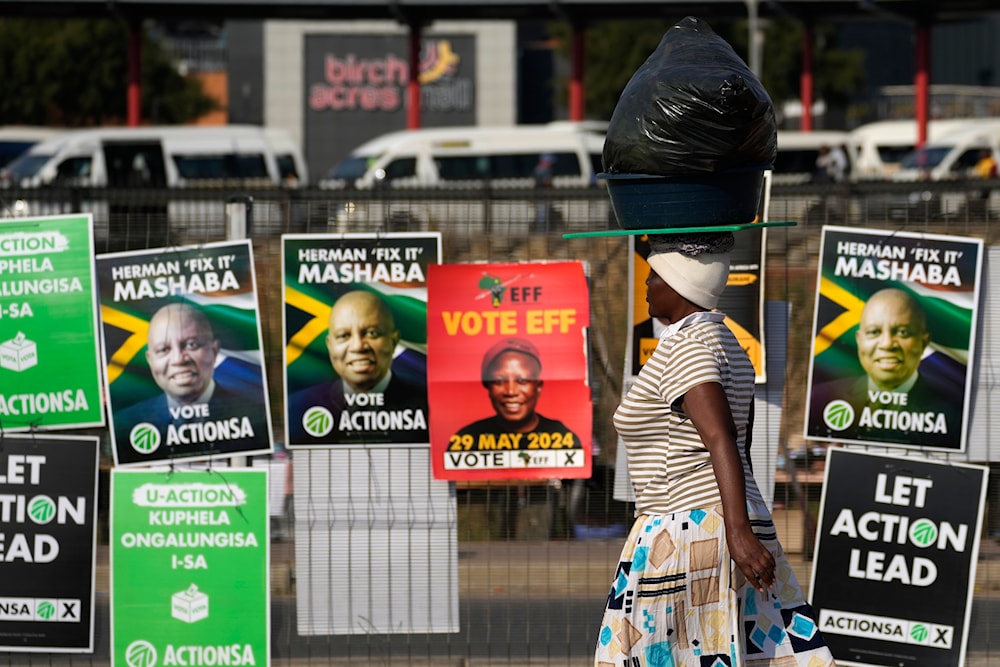South Africa's ANC loses majority, seeks coalition
President Cyril Ramaphosa must choose allies from the right or left to stay in power.
-

A woman walks past election posters in Tembisa, east of Johannesburg, South Africa, Tuesday, May 28, 2024, ahead of the elections on May 29. (AP)
South Africa's ruling ANC awaited the imminent confirmation on Saturday that it had lost its three-decade-old absolute majority and would need to find allies to stay in power.
With more than 98 percent of the votes from Wednesday's election counted, President Cyril Ramaphosa's African National Congress had only 40.15 percent support, a decline from the 57.5 percent it secured in 2019. This marks a historic turning point for South Africa, as the party has enjoyed an absolute majority since 1994 when liberation leader Nelson Mandela led the nation into democratic rule.
"We have been talking with everybody even before the election," ANC's deputy secretary general Nomvula Mokonyane told AFP on Friday, saying the party's decision-making body would set the course to follow after final results are announced.
"Anything must be based on principles and not an act of desperation."
Final results to be announced on Sunday
As votes continued to be validated, data from the Independent Electoral Commission (IEC) showed that the centre-right Democratic Alliance (DA) held second place with 21.71 percent, a slight increase from its 20.77 percent in 2019. However, it was not a surge by the DA that cut into the ANC's vote share.
In third place was former president Jacob Zuma's uMkhonto weSizwe (MK) with 12.6 percent, a surprising result for a party founded just months ago as a vehicle for the former ANC chief.
The radical leftist Economic Freedom Fighters (EFF) was in fourth with 9.4 percent.
The final results were set to be formally announced on Sunday, but the IEC results website was being updated throughout the day. With the outcome no longer in doubt, politicians were now focusing on the prospects of an ANC-led coalition.
South Africans began casting their votes on May 29 for the country's general election, expected to push away the African National Congress (ANC) from a three-decade-long majority rule run.
President Cyril Ramaphosa's ANC faced fierce competition from parties on the right and left, as the country grapples with high rates of unemployment and crime.
With more than 27 million voters registered for today's election, the left, led by Julius Malema's Economic Freedom Fighters (EFF) and former President Jacob Zuma's uMkhonto we Sizwe (MK Party), is expected to gain a share of ANC's seats in the parliament.
DA holds 'different ideals'
The ANC has held a firm grip on South Africa's democracy, boasting an uninterrupted succession of five presidents from the party. However, for President Cyril Ramaphosa to stay in power, he must now weigh the decision of aligning with allies either on his right or left.
There will likely be resistance within his movement to forming an alliance with the second-placed DA, led by white politician John Steenhuisen. The DA's free-market agenda, advocating privatizations and an end to black economic empowerment programs, contradicts the traditions of the ruling party.
Mandela's grandson, Mandla Mandela, an outgoing ANC lawmaker, told AFP that the DA held "different ideals," making it too difficult to consider partnering with them.
He suggested that the radical left groups led by former ANC figures, such as firebrand Julius Malema's EFF or Zuma's MK, were more likely to be potential allies. However, these options might also meet resistance within the more moderate sections of the ANC.

 4 Min Read
4 Min Read








